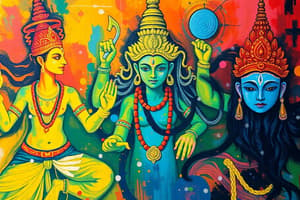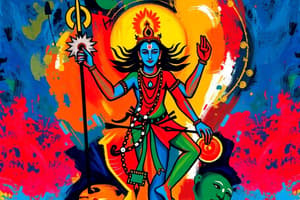Podcast
Questions and Answers
What is the ultimate goal in Hinduism?
What is the ultimate goal in Hinduism?
- Fulfilling social roles and duties
- Attaining a state of self-realization and understanding of Brahman (correct)
- Achieving material wealth and prosperity
- Engaging in selfless acts and maintaining virtues
What is the role of Dharma according to the text?
What is the role of Dharma according to the text?
- To encourage people to engage in violent and unethical behavior
- To guide people towards selfish acts and personal gain
- To provide a path to spiritual enlightenment and moksha
- To ensure people fulfill their social roles and responsibilities (correct)
What is the relationship between Dharma and Moksha according to the text?
What is the relationship between Dharma and Moksha according to the text?
- Dharma is a means to achieve Moksha, the ultimate goal (correct)
- Dharma and Moksha are separate paths that lead to different spiritual outcomes
- They are completely unrelated concepts in Hinduism
- Dharma and Moksha are mutually exclusive and cannot be achieved together
What is the role of Brahman in the context of Moksha according to the text?
What is the role of Brahman in the context of Moksha according to the text?
How are the concepts of Karma and Dharma related according to the text?
How are the concepts of Karma and Dharma related according to the text?
What is Brahman considered to be in Hinduism?
What is Brahman considered to be in Hinduism?
What is the key concept of Karma in Hinduism?
What is the key concept of Karma in Hinduism?
What is the core meaning of Dharma in Hinduism?
What is the core meaning of Dharma in Hinduism?
Which of the following is NOT a key concept in Hinduism mentioned in the text?
Which of the following is NOT a key concept in Hinduism mentioned in the text?
Flashcards are hidden until you start studying
Study Notes
Hinduism
Hinduism is one of the world's oldest and most complex religious traditions, with millions of followers worldwide. It originated in the Indian subcontinent and has shaped much of its culture and history. Key concepts in Hinduism include Brahman, Karma, Dharma, and Moksha.
Brahman
Brahman refers to the ultimate reality and Godhead in Hinduism. It is considered both the creator of the universe and beyond it. In some texts, Brahman is described as the source of all existence and consciousness. Some Hindus also identify themselves with Brahman, which leads them to view every person and creature as manifestations of God. This concept of unity between individual souls and the universal soul underlies many aspects of Hindu philosophy and ethics.
Karma
Karma is the law of cause and effect within Hinduism. An action performed during this life or any previous lives will have consequences in future existences. Good acts result in positive karma, while bad actions lead to negative karma. Over time, these accumulated karmic effects determine a person's place in society and their future rebirth. However, there are ways to purify your karma through devotion to deities and following dharma.
Dharma
Dharma is the idea of righteous duty and righteous living, often translated into English as 'duty', 'ethics','morality', 'virtue', 'righteousness', or 'law'. Dharma involves carrying out duties correctly and responsibly, including fulfilling social roles like being a good son, daughter, husband, wife, parent, etc.. Dharma guides people towards selfless acts, honesty, truthfulness, nonviolence, integrity, and other virtues.
Moksha
Moksha, or liberation from samsara, is a state of ultimate spiritual enlightenment and freedom from suffering. It is the goal of many Hindu philosophical systems. To achieve moksha, one must purify their soul and attain a state of self-realization and understanding of Brahman. This can be achieved through various spiritual practices and understanding of Hindu texts.
These concepts are interconnected and form the foundation of Hindu beliefs and practices. While each concept has its unique significance, they work together to shape the spiritual journey of a Hindu.
Studying That Suits You
Use AI to generate personalized quizzes and flashcards to suit your learning preferences.




